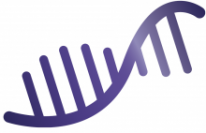RNA-Seq
RNA-Seq is the most comprehensive high-throughput sequencing-based approach for the qualitative and quantitative analysis of entire transcriptomes of model and non-model organisms. Fragmented cDNA is sequenced, the resulting sequences (“reads”) are mapped and compared to known genomes or transcriptomes. For non-model organisms, the reads are assembled and annotated for example to protein databases or other transcriptomes. Quantification of the RNAs or contigs is achieved by counting the corresponding fragments after annotation to a known genome or transcriptome or after de novo assembly and annotation to the Swissprot /TREMBL protein-database. As full-length transcripts can be analyzed, the technique detects splicing-variants, SNPs and indels, transcription start sites and alternative poly-adenylation.
Data quality is strongly depending on vigilant sample preparation, sequencing depth and -length. Datasets are immense and the analysis requires powerful computers and fastidious bioinformatics.
Please click for information about our smallRNA-Seq service or Kit or MACE-Seq service or Kit.
Profit from our longtime experience in sample preparation and bioinformatics.
Why “number of reads” does not equal “sequencing depth”
In a regular RNA-Seq experiment, the quality of the data is often thought to be related to the numbers of sequenced reads. However, during PCR steps of the sample preparation procedure, the original template molecules are amplified. While only the template molecules carry the information, the PCR products are simply copies of them and in theory only one copy would be sufficient, while all others do not contribute to the information content of the sample. It is therefore pivotal to identify these “PCR copies” and eliminate them, as they can introduce a bias into the data. At the same time, only those “copies” can be kept that have the best read quality, which will strongly improve the data quality in general. The best currency for RNA-Seq quality is therefore the number of unique reads in the sample, not the number of reads. With TrueQuant, we can eliminate PCR copies and therefore strongly improve the results.
GenXPro’s RNA-Seq service options
- “Classic” hexamer-based cDNA production
- RNAseq from poly-adenylated mRNA
- RNAseq from rRNA-depleted RNA to include non-polyadenylated RNA e.g. ncRNA
- 3’mRNA-Seq (MACE-Seq) for high-trhoughput transcriptomics
- smallRNA-Seq from ultra-low input, liquid biopsies, EVs, single cells
Bioinformatics for RNAseq
- Copy/duplicate removal of RNA-seq reads
- Quality optimization (trimming, optional error correction if possible)
- Mapping to known genomes
- Mapping to transcriptomes
- de novo assembly and annotation to protein database
- Transcript- and isoform quantification
- Translocation events
- SNPs detection
- Indel detection
- Splicing variants analysis
- Gene Set Enrichment Analyses (GSEA)
- GO-Enrichment analyses
- Principal component analyses
- Plots and heatmaps
Data provided via sftp. Data can be provided in all standard formats of choice.
Our bioinformatics service is also available for external data: Simply ask us for a quote if you need high-quality analyses of your NGS data.
Required Material
- Regular: 1-10 microgram of total RNA, DNA free, or equivalent fresh material
- Low amounts: 1-100 ng of total RNA, DNA free, or equivalent fresh material
For orders or quotation requests, please use our web-tool
-
From tissue to results- full service or kits for all your samples


